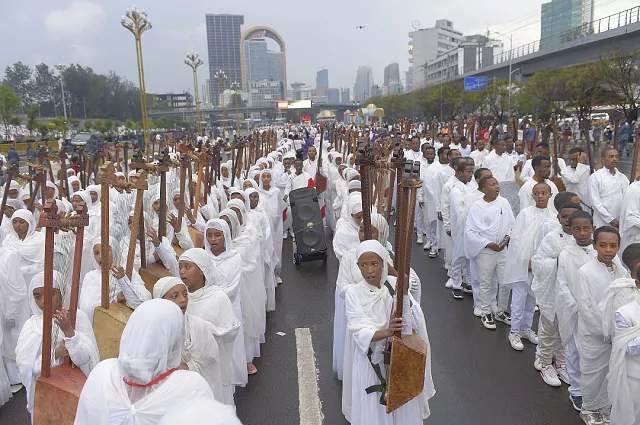Africa
Ethiopian Faithful Celebrate Meskel, Offering Prayers for Peace

As Ethiopians mark the Meskel festival, a significant Christian celebration, they gather to pray for peace and unity. Learn more about the tradition and its deep spiritual meaning.
Ethiopian Orthodox Christian devotees participated in a procession and chanted hymns during a religious celebration known as “Meskel.”
On Thursday, September 26, thousands of Ethiopians convened at Meskel Square in Addis Ababa.
This festival commemorates the cross on which Jesus was crucified, as per church doctrine, and its rediscovery by Saint Helena, the mother of Emperor Constantine.
Recognized as a UNESCO Intangible Cultural Heritage of Humanity, this religious observance holds significant cultural importance.
The celebrations will extend until Friday, September 27, which is designated as a national holiday, during which the faithful engage in church services and cherish moments with their families.
As part of the Meskel festivities—derived from the Amharic term for “cross”—bonfires are ignited throughout the nation.
On Thursday at Meskel Square, the patriarch of the Ethiopian Orthodox Tewahedo Church ignited a large bonfire in the presence of thousands of worshippers dressed in white attire.
Throughout Ethiopia, many congregate in public squares and near churches to kindle similar bonfires made from stacks of logs, dry leaves, and grass.
Following prayers and religious ceremonies, a celebratory feast featuring “kitfo,” a dish of minced meat akin to steak tartare, is enjoyed during the Meskel festivities.
The church’s doctrine holds that this festival commemorates the cross on which Jesus was crucified and its rediscovery by Saint Helena, the mother of Emperor Constantine.
Legend has it that Saint Helena experienced a divine revelation in a dream, directing her to ignite a bonfire and trace the smoke to uncover the cross buried in Jerusalem.
This year’s celebration occurs during a challenging period for Ethiopia, the second-most populous nation in Africa and one of the largest landlocked countries globally.
Prime Minister Abiy Ahmed’s attempts to secure maritime access through the semiautonomous Somali region of Somaliland have provoked ire among Somali authorities, who perceive this action as an act of aggression.
Simultaneously, Ethiopia is embroiled in a dispute with Egypt regarding the substantial dam on the River Nile, which Egyptian officials argue will reduce their access to essential Nile water.
These issues contribute to the ongoing insurgency in the northwestern region of Amhara.
Recent weeks have seen heightened tensions in the Horn of Africa due to these disputes.
